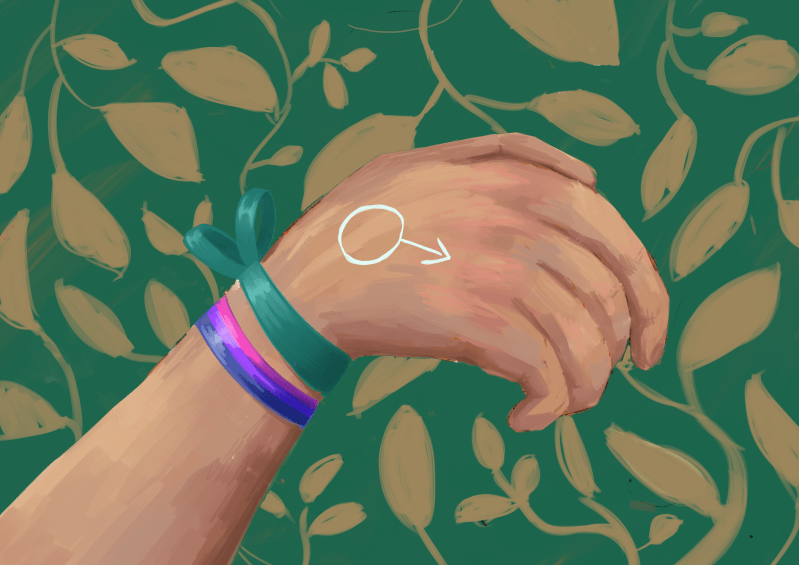Content warning: This article contains references to sexual assault.
Being assaulted years ago by a guy, to this day, is the only time I have ever been that close with another guy (consensual or otherwise). The first person that I told that story to was also the first person I came out as bi to. It feels impossible to separate my sexuality from my story as a survivor, which makes it especially confusing to come to terms with some of the feelings of isolation related to my sexuality and experiences as a survivor.
I generally viewed the community around surviving sexual assault as a predominantly female community. I’ve wanted nothing more than to respect that and not be a trigger because of my gender, so I’ve just spent my three years on campus without much engagement in any of the related communities and resources at all. I’ve honestly never felt represented as a man in these spaces. When the SHARE Title IX Office has tabled at White Plaza, I’ve always walked by without engaging, wondering how things might change if I did engage with those resources or even spoke at Take Back The Night.
I never had to think about this before coming to campus. I was assaulted in early elementary school — a time when the most complicated things on my mind were the desire to be the fastest boy in recess and watching ‘Annoying Orange’ on YouTube. Surely as a defense mechanism, in order to avoid some traumatizing childhood years, the little strength my even littler brain could muster forced those memories deep into my subconscious.
Little Sebastian lacked the words, understanding and relative emotional maturity to remember, let alone process what happened. Back then, I was never capable of understanding the things about myself that I have since being on campus. While Father Time afflicted me with still traumatic memories, he ended up blessing me with a richer understanding of who I am as a person.
Now that I have spent a lot of time on campus, I wonder if my experiences, and therefore my lack of engagement on campus, are even that serious. I was not assaulted on campus, and I haven’t seen my assaulter in over a decade. He and I were the same age. I only did what he wanted because, oddly enough, that’s what he wanted in exchange for letting me play Mario Super Sluggers on his Nintendo Wii. The use of the word “assault” doesn’t even feel appropriate for me to use sometimes because of what it invokes for so many people; coercion feels a bit more appropriate for my situation.
Because my story feels so out of place from other people’s stories, I’ve come to personally feel out of place with all things sexual assault on campus.
As progressive as Stanford is, I’m still a man who grew up with patriarchal expectations. Men are expected to be stoic. Men are expected to exude strength under pressure. Men are expected to bottle everything in. Even when men are permitted to express themselves in so-called progressive spaces, their expression is pushed into masculine confines. I don’t smile as much as I would like to. I’d like for welcoming body language to come more naturally to me. I would’ve liked to have found the relatively good outlets that I do have – such as journalling, poetry, cooking and therapy – years before I started embracing them. I’d like to think that I at least think outside of the societally imposed box, but my actions haven’t had much to show for it.
It goes without saying that there’s a great deal of internalized shame when it comes to my gender and experiences as a survivor. Unfortunately, this is a situation that I’ve also felt deeply apathetic towards and haven’t felt too strong a desire to even change in the first place. Deep down, I want to change that.
As with anything, change takes time.
It’s baby steps. To this day, one of my favorite classes at Stanford is FEMGEN 101, which helped me gain a richer understanding of my intersecting identities and how they affect my lived experiences. One of the people I feel most safe with is a close friend of mine who is also queer and a survivor. Back when I was a news reporter for The Daily, it was an especially personal learning opportunity to write about a protest on sexual violence and report cases of sexual harassment, sexual violence and gender discrimination on campus – the latter of which was my first ever piece as a Daily staffer.
I’m both a man and a survivor. While I’ve felt ashamed about each of those things at different points and to varying degrees over time, I’m probably in a better place with these things than I’ve ever been before. Elementary school me would be in awe of where I am today. My current self, too, is proud of where I am today.
I have the teal ribbon bracelet I started wearing more often now. I have friends that are fellow survivors for whom I’ll forever be grateful. I have the memory of the first ever person I shared my story with. With my time as a Stanford undergraduate student now extended, there is a lot more I have to potentially look forward to. Now I have the future to look toward — one with a healthier approach to masculinity and a stronger journey as a survivor.
